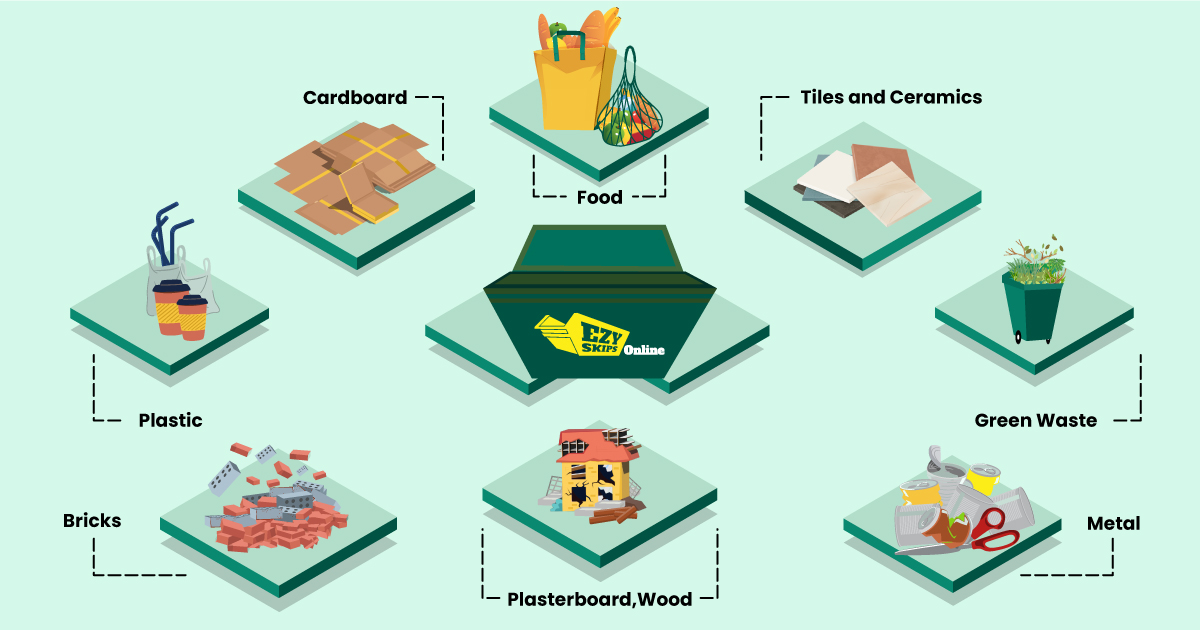
When hiring a skip, there are a few things to consider. Before deciding on the size of the skip or where it’ll be placed, it’s important to figure out if this waste management solution is the right fit for your needs. A lot of people assume skips can be used to get rid of anything, but that’s not the case — certain materials aren’t suitable for disposal in skips. Think about the type of project you’re working on and whether a skip is truly the best option for handling your waste.
This guide will take you through what can and can’t be placed in a skip, making sure you’re fully informed before making your decision. While skips are perfect for many projects, they’re not suitable for all, and this info will help you make the right choice.

For a complete list of items that can’t go in a skip, we recommend checking out our guide on What Cannot Be Put in a Skip?. It provides detailed advice on what is and isn’t suitable for skip disposal.
What Can You Put in a Skip Bin?
There are specific rules and regulations around what can and can’t be placed in a skip, and it’s important to follow these carefully. Items that aren’t permitted in a skip will need to be disposed of separately — for example, you could arrange a collection through your local council or take the items to your nearest recycling centre.
When hiring a skip, you’ll often be asked about the type of waste you plan to dispose of. This is because, while many materials can be placed in a skip individually, some cannot be mixed together. It’s important to understand the type of your waste so you can determine which items can be combined in one skip.
If a particular type of waste is prohibited, it’s usually because it poses a risk to the environment or public safety. For instance, electrical items and hazardous materials are commonly restricted. Here’s a quick guide to help you understand what can typically be disposed of in a skip.
Plasterboard
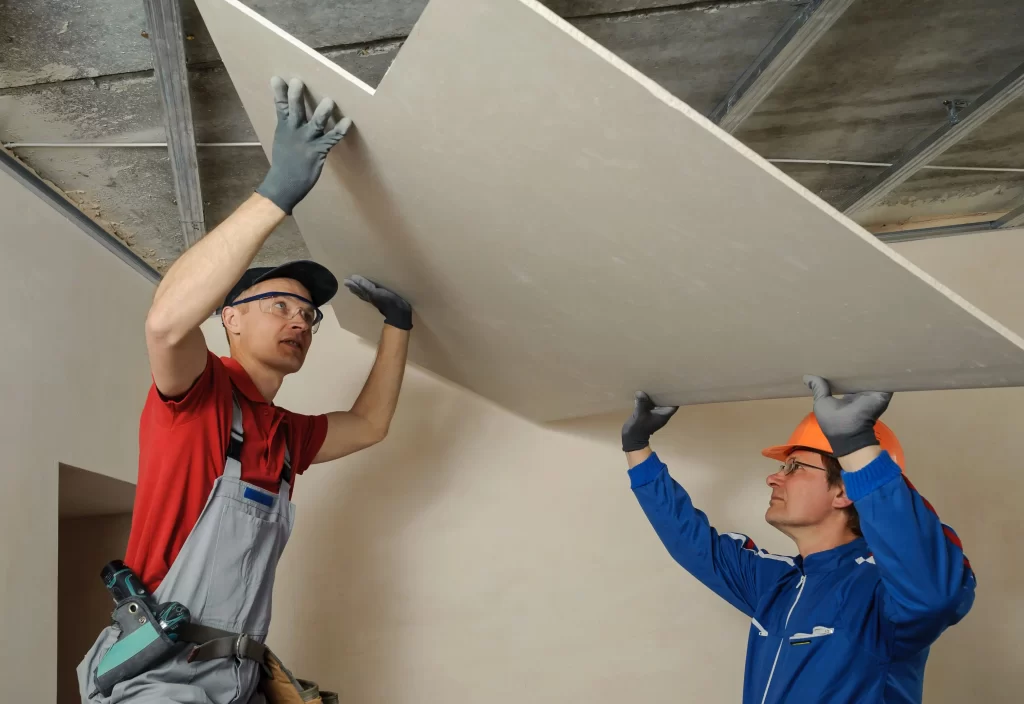
Plasterboard can technically be disposed of in a skip, but it must not be mixed with other materials. It should also be placed in a covered skip to stop it from getting damp.
Plasterboard is made with an inner layer of gypsum, a mineral, which is sandwiched between two layers of lining paper. Gypsum contains high levels of sulphates and can become hazardous if it gets wet, which is why it’s important to dispose of plasterboard properly.
The good news is you can use a skip to get rid of your plasterboard and gypsum, but it’s a bit more complicated than it might seem at first. If you’re working on a building or renovation project, you’ll likely have more to dispose of than just plasterboard. This means you’ll need one skip for mixed building materials and another covered skip purely for plasterboard.
Tiles and ceramics

Whether you’re renovating your kitchen or working on a demolition project, you’ll probably have heaps of tiles or other ceramic materials to dispose of. These can go in a skip and are typically considered hardcore waste. These materials can usually be disposed of with concrete and bricks, which is perfect if you’re doing building or renovation work.
Cardboard
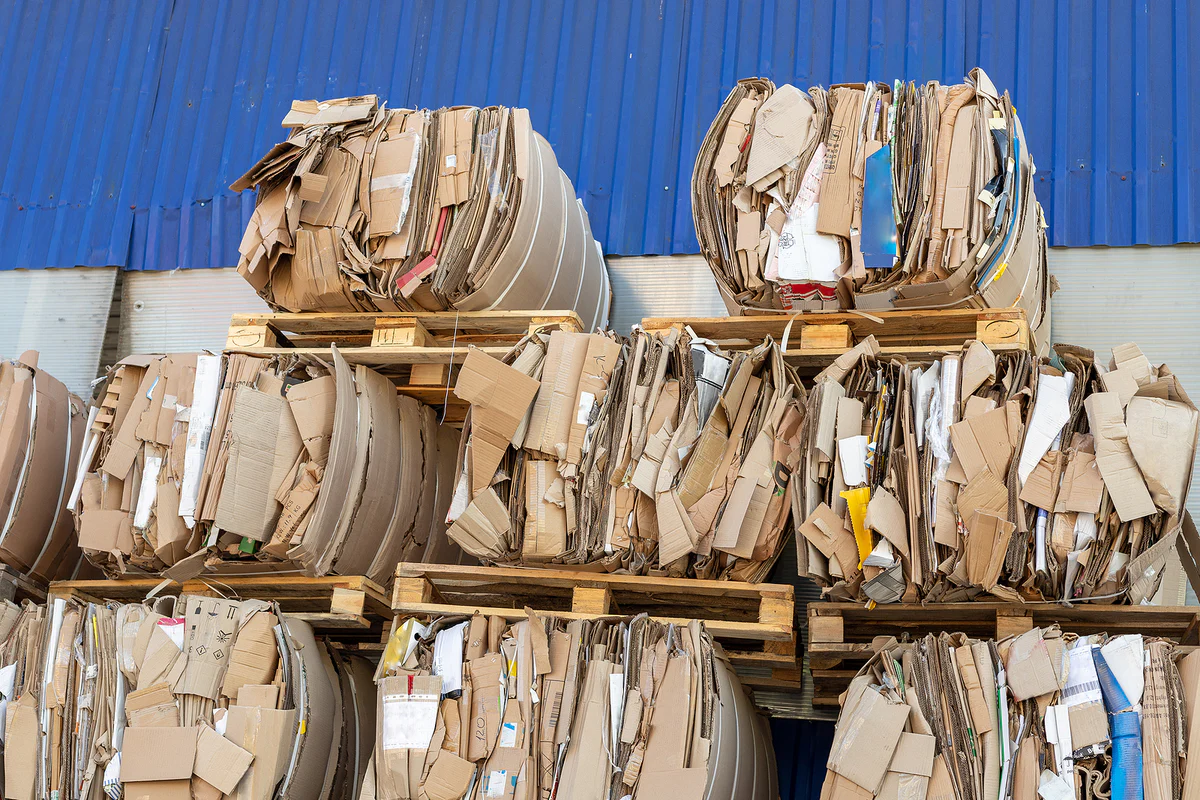
If you’ve just moved house or run a business that creates a lot of packaging waste, you might need to get rid of a heap of cardboard. And yep, you can use a skip for this.
Cardboard is classed as dry mixed recycling and can be disposed of with other mixed packaging, like paper, newspapers, plastic bottles, plastic films, hard plastics, steel, and aluminium.
Metal
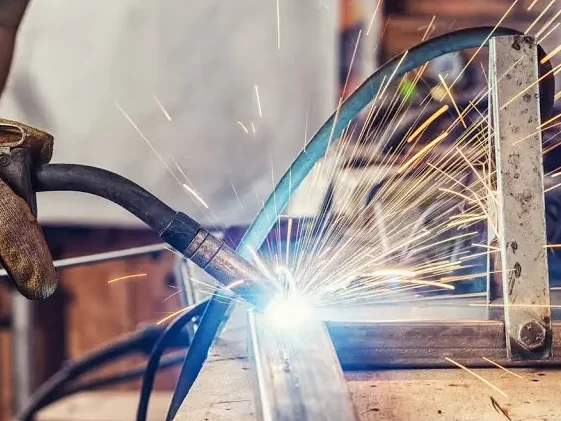
If you’ve got solid metal items you need to get rid of, they can go in a skip. Depending on what other materials you’re tossing out, it might be classed as construction or mixed metal waste.
You’ll probably generate a lot of metal waste if you’re clearing out a workspace, doing a demolition project, or working on a construction site, for example.
Wood

Wood can be disposed of in a skip. If you’re working on a building or demolition project, you might want to get rid of your wood along with other materials like metal, bricks, and plastic. In that case, it will be classified as mixed construction waste.
Plastic
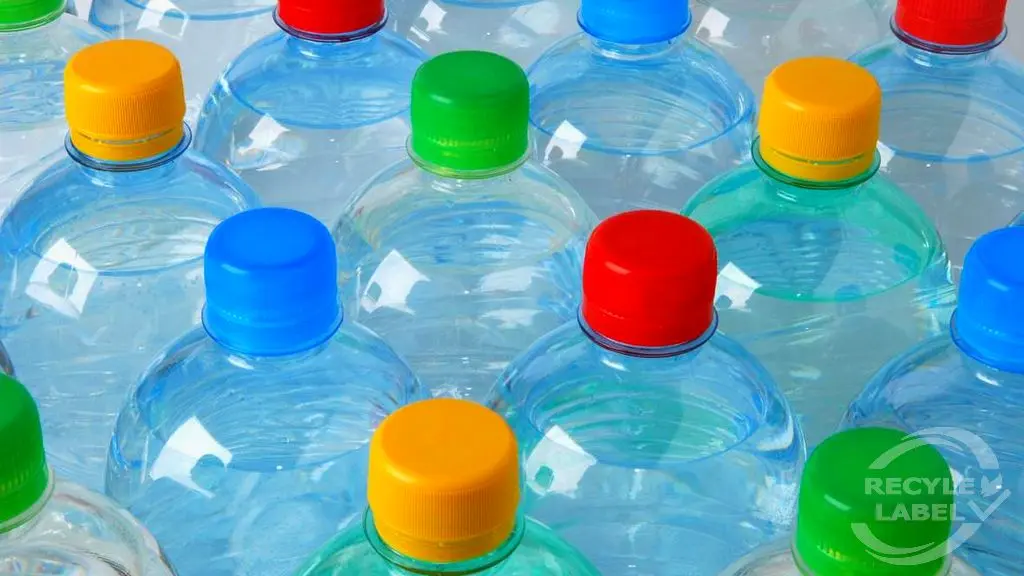
You can throw plastic in a skip, and it’ll fall into different categories depending on the types of items you have and what else you’re getting rid of.
If your plastic waste comes from building or demolition work, and you also need to get rid of materials like wood, metal, and brick, it’s best to hire a skip suited for mixed construction waste. On the other hand, if you’re disposing of smaller plastic items like bottles, films, and hard plastic products, these will be classed as dry mixed recycling.
Garden Waste
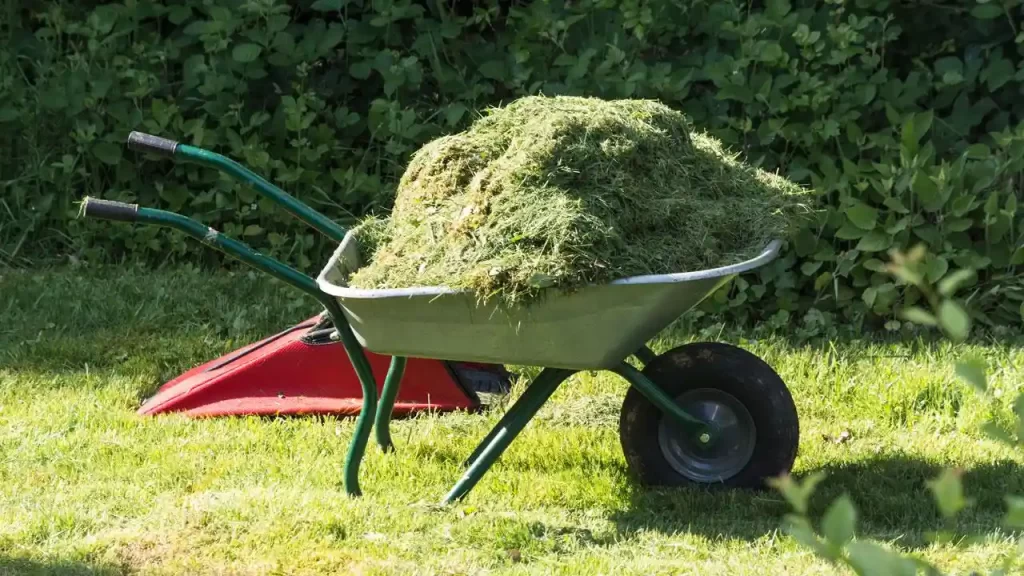
Whether you’re working on a landscaping job or just cleaning up your own garden, you might have a fair bit of waste to get rid of. This could include leaves, turf, and branches, which will be classed as green waste and can be thrown in a skip.
Green waste covers anything that’s compostable, so you can also chuck food scraps in your skip along with the rubbish from your garden.
Bricks
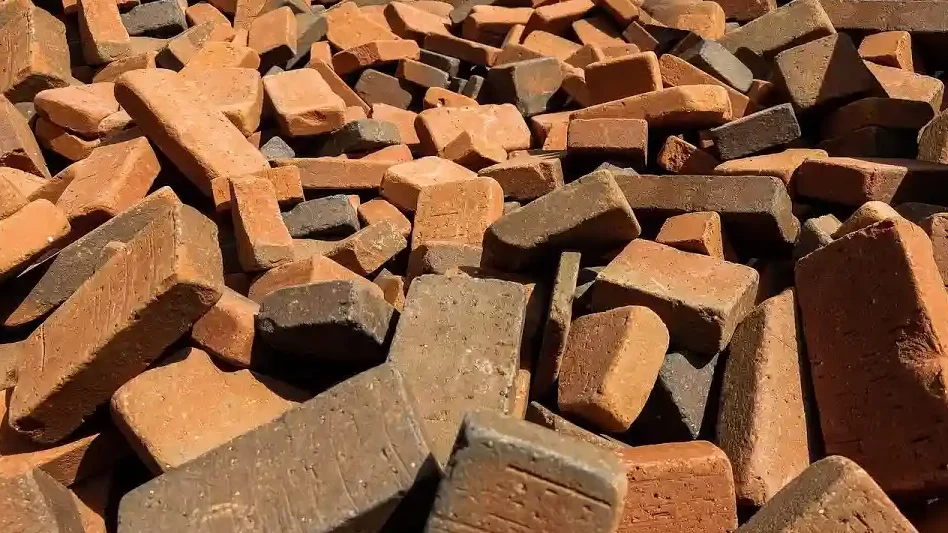
If you’re working on a project that involves demolition, you might be wondering if you can hire a skip to get rid of the bricks you no longer need. The good news is, yes — bricks can go in a skip, but there are a few things to keep in mind.
First off, every skip you hire comes with a weight limit, which will impact how many bricks you can dispose of at once. For example, our 6m³ skips have a weight limit of 1,000kg, while our 10m³ skips can hold up to 1,700kg.
Bricks are generally considered construction waste and can be disposed of with materials like wood, metal, and plastics. However, if you’re also getting rid of concrete, tiles, or ceramics with your bricks, this will typically be classed as hardcore waste.
Food
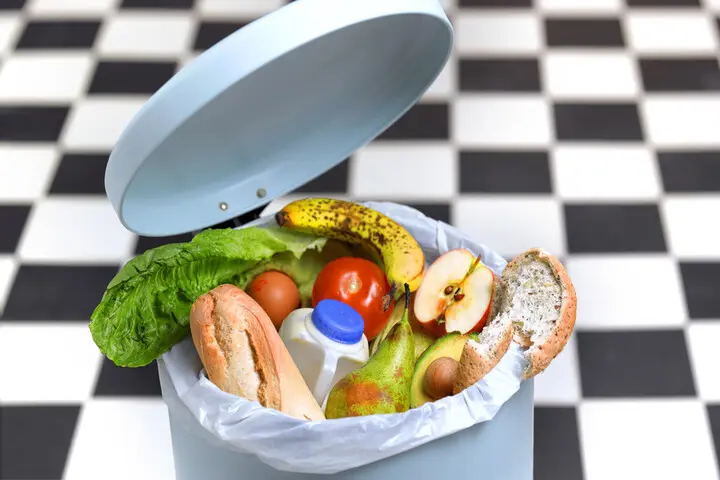
If you often have large amounts of food to get rid of, like if you run a restaurant or supermarket, you can throw it in a skip.
When you hire a food waste skip, all food must be removed from its original packaging and placed in clear plastic bags. Alternatively, if you’ve hired a green waste bin and just have some extra food scraps to dispose of, you can chuck it in as long as it’s compostable.
What Can’t You Put in a Skip Bin?
There are certain items you won’t be able to throw in any skip you hire, usually because of the risks they pose to people or the environment. If you put the wrong items in your skip, the team coming to collect it may refuse to take the waste until the issue is sorted. You could even cop extra charges for the time and effort it takes to sort things out. So, it’s worth getting it right from the start.
It’s also important to keep an eye on your skip and make sure no one else is chucking in unauthorised items, especially if it’s left out in the open. If the wrong item is found in your skip, you’ll be held responsible, even if you didn’t put it there.
We’ll walk you through some of the forbidden items you might be wondering about, but keep in mind this list isn’t exhaustive. If you’re unsure about anything, just give us a shout before booking your skip. We’re happy to help you find the right waste management solution for your needs.
Batteries
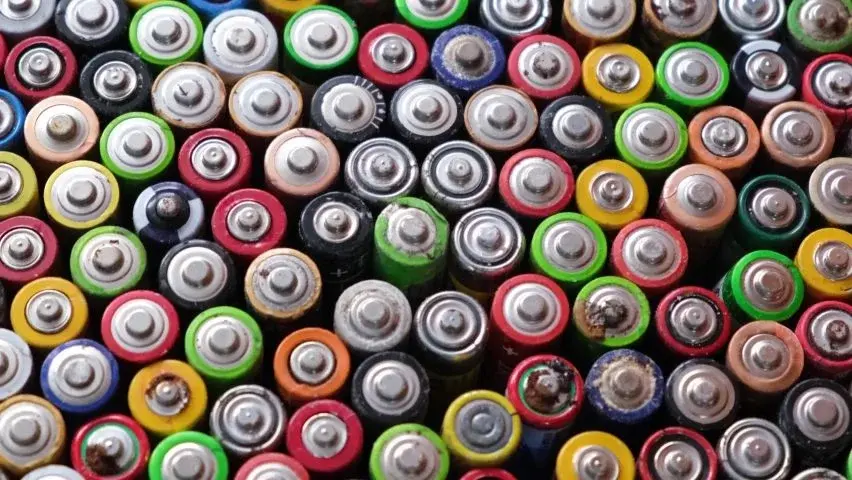
You should never throw your old batteries in a skip, as they contain metals and chemicals that can be harmful to the environment or anyone handling your waste.
Instead of disposing of your batteries in a skip, they should be recycled. Many retailers and supermarkets now offer battery recycling points. By dropping them off at one of these locations, you can be sure they’ll be handled in the most responsible way possible.
Fridges and Freezers
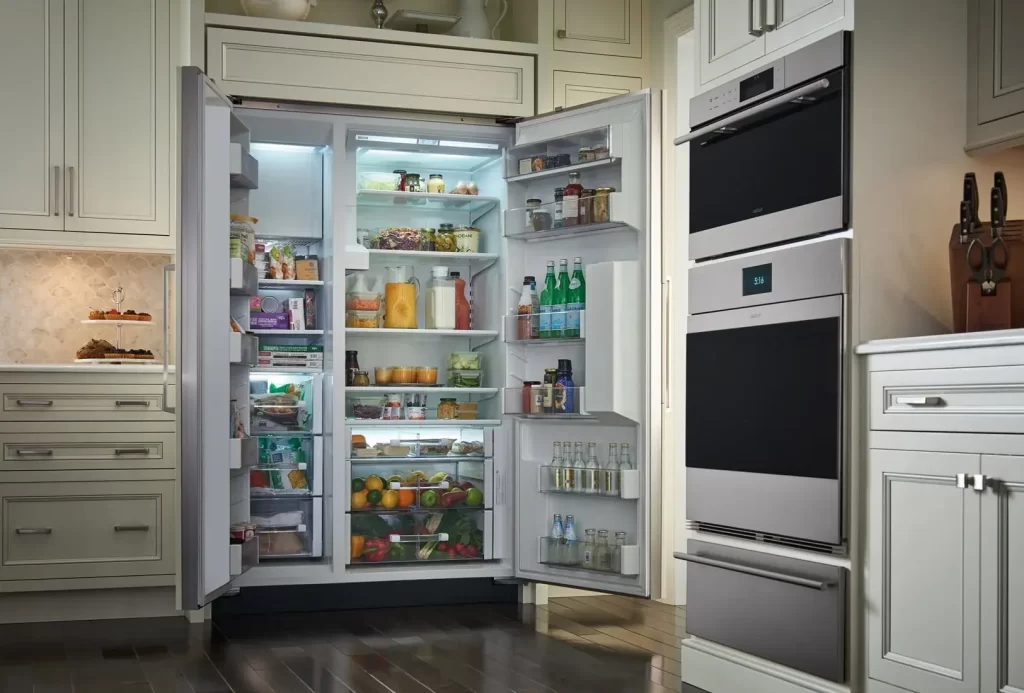
You won’t be able to dispose of your fridge or freezer in a skip, as they are not only electrical items but also contain materials and refrigerants that can be harmful to the environment.
As with other electronic waste, you have several options for getting rid of your fridge or freezer. If it’s still in good working order, you could contact your local council to see if they offer a reuse service to pass it on to someone in need. Some charity shops or organisations may also accept your whitegoods, either to sell for fundraising or to give to a household in need.
If your fridge or freezer is no longer working, or if you can’t find an organisation to take it, the best option is to recycle it. When you purchase a new appliance, the company delivering it may take your old one away and dispose of it responsibly. Alternatively, you can drop it off at your local recycling centre or arrange a collection. You can find out how to organise a collection through your local council’s website.
Asbestos
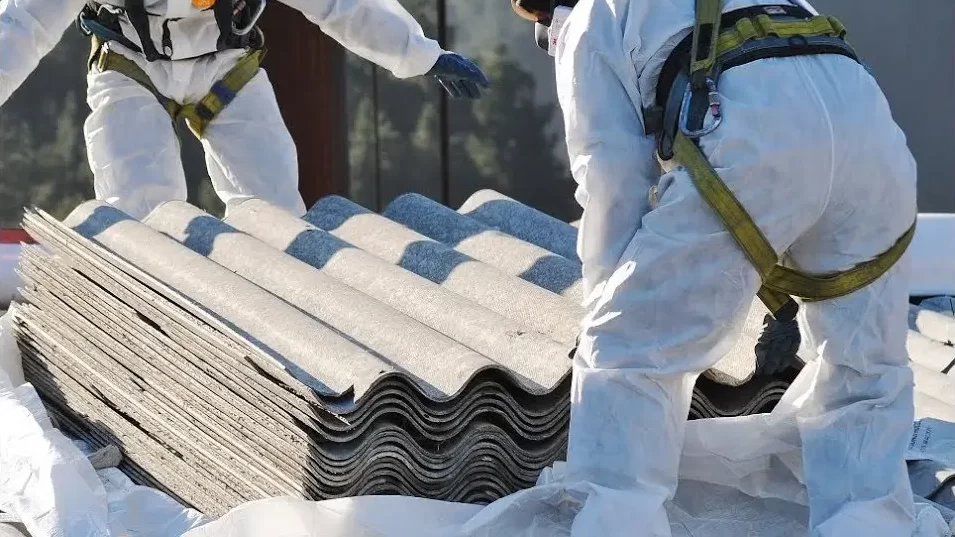
Asbestos is classified as hazardous waste and must be disposed of in a specific way, so it can’t be placed in your skip.
If you come across asbestos during a renovation project, the Australian government provides resources to help with its safe disposal. You can contact your local council or the relevant environmental authority, which will guide you on the safest and most responsible way to get rid of it. Be sure to follow the correct procedures to handle asbestos safely.
Tyres
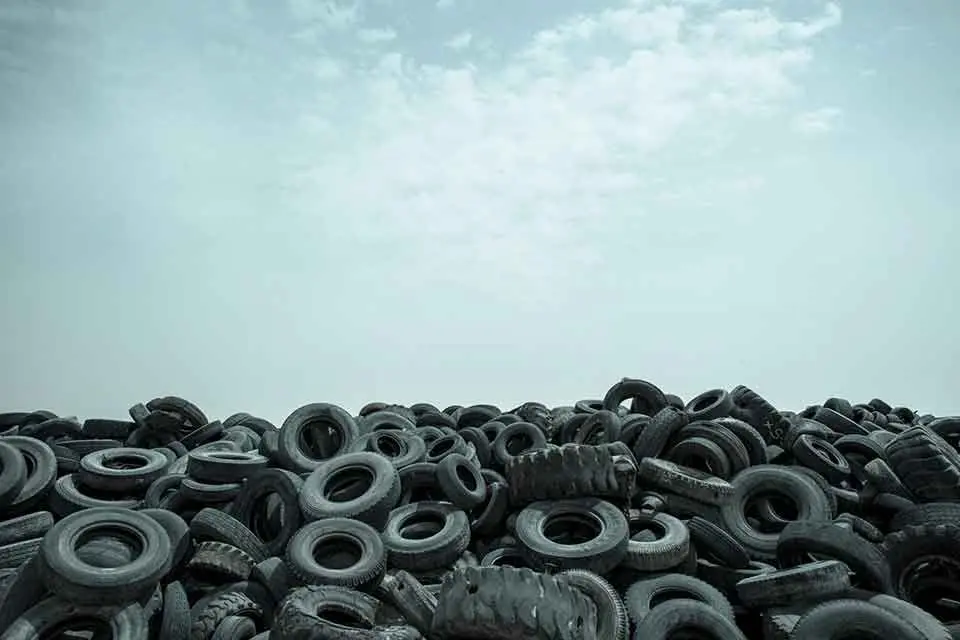
Unfortunately, tyres can’t be thrown into a skip you hire, but there are plenty of responsible ways to dispose of them.
Start by checking with your local recycling centre to see if they accept tyres, and if so, how many you can drop off at once. If they don’t, or you have too many to get rid of, it’s worth contacting local garages to see if they can take them off your hands. If you’re unable to transport the tyres yourself, or if none of the recycling centres or garages can help, there are specialised companies that offer tyre collection services.
Paint or Paint Tins
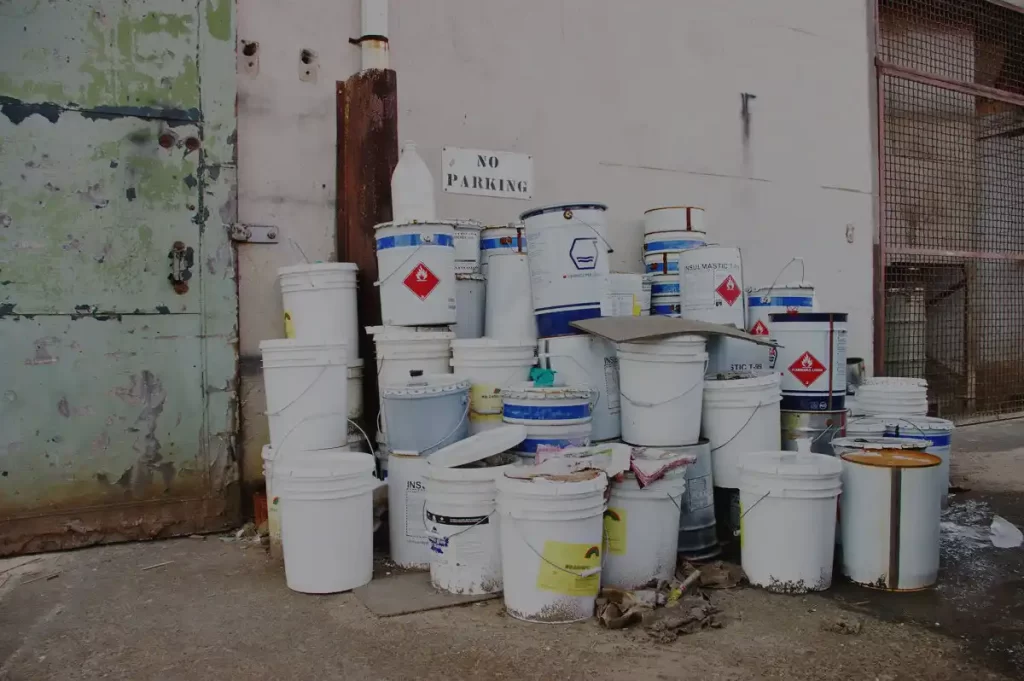
Most paints contain chemicals that can be harmful to both humans and the environment, so they can’t be disposed of in a skip. If you have leftover paint from a DIY or renovation project, consider donating it to family and friends or even a local charity or community group that could make use of it. If you can’t find anyone to take it off your hands, you can usually drop it off at your local recycling centre, though they’ll often ask you to let the paint harden first.
If you’ve used up all the paint in the tin, you might think it’s okay to throw the packaging in a skip or add it to your household recycling. However, this isn’t usually the case, as even the tins are considered hazardous waste. The best option is to take your empty paint tins to your local recycling centre, where they’ll be disposed of responsibly.
Gas Bottles
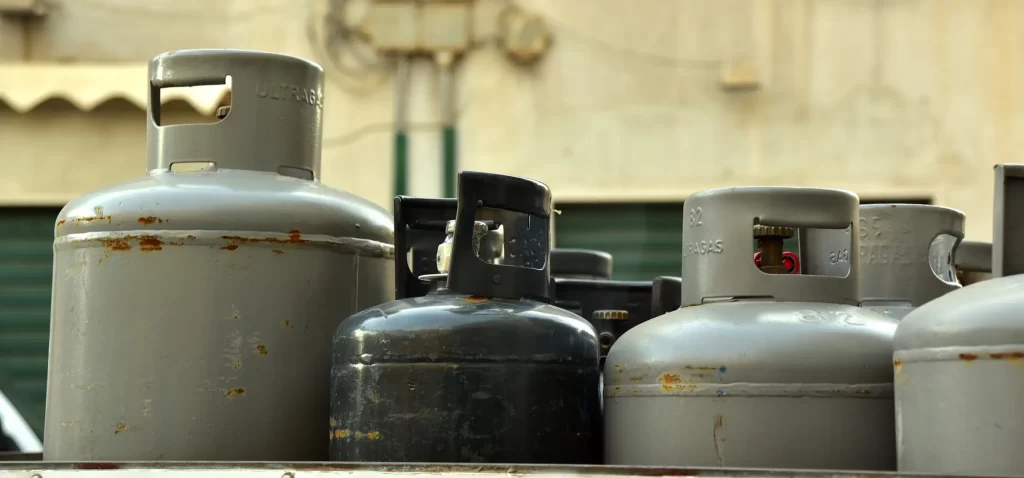
You can’t dispose of gas bottles or canisters in your skip, even if you think they’re empty. This is because they may still contain residual gas, which skip hire companies are generally not licensed to handle.
Usually, you can take your gas bottles to your local household waste recycling centre. Alternatively, contact the retailer where you purchased the gas, as they may accept the canisters for reuse and recycling.
Medical Waste
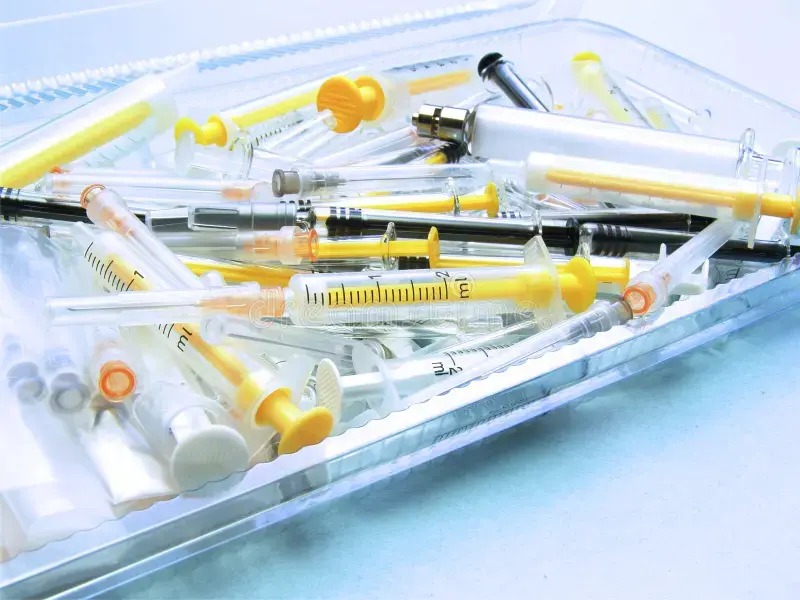
Whether you’re recovering from an injury or someone in your household has a long-term illness, you may often find yourself with clinical or medical waste that needs to be disposed of. This could include, but isn’t limited to:
- Used medical dressings
- Syringes, needles, or other sharp instruments
- Blood or bodily fluids
- Swabs
- Incontinence pads or nappies
- Medical instruments
- Unused medication
Many of these items can be harmful, so they can’t be disposed of in a skip and should be handled in a specialist manner.
Some types of medical waste, such as nappies and incontinence pads, can be disposed of with your regular household rubbish. Just make sure they’re bagged up separately before being placed in your wheelie bin.
More hazardous medical waste, like syringes and medical instruments, typically needs to be placed in clearly labelled waste bags and collected by a specialist disposal service. You can find information about local clinical waste collection services through your local council or government website. If you have any questions or concerns, your GP surgery should be able to offer advice and assistance on proper disposal.
Electrical Appliance and Equipment
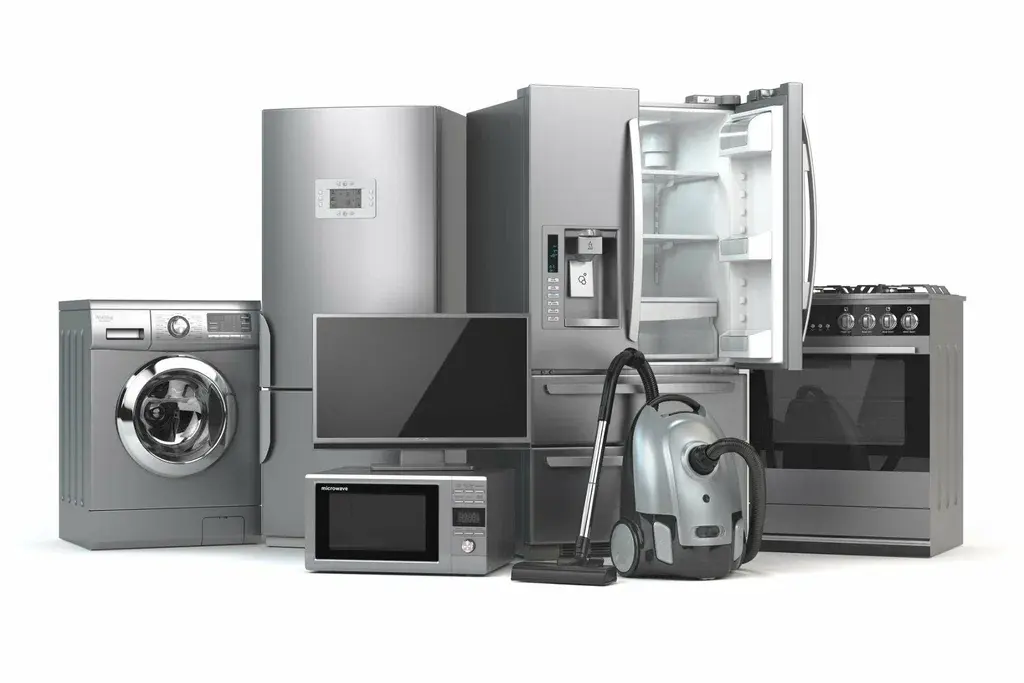
When you’re cleaning out your home or workspace, you might come across old electronics you’d like to get rid of, such as phones, TVs, and laptops. However, these items are classified as hazardous waste, as they often contain materials that could be harmful to both people and the environment. As a result, you won’t be able to dispose of your electronic waste in a skip.
Fortunately, there are several options for getting rid of unwanted electronics. If they’re still in good working condition, you could ask around your family and friends to see if they could make use of the items, giving them a second life. Alternatively, you could sell them online through platforms like eBay or Facebook Marketplace. You might also consider contacting local charities, such as homeless shelters, to see if they’d be interested in taking them off your hands.
If your electronics are no longer functional and unlikely to be of use to anyone, recycling is the best option. Most local recycling centres will accept electronic items, and some offer collection services. Recycle Now has a tool to help you find the best way to recycle your electronics, depending on where you’re located.
When hiring a skip, it’s important to ensure the waste you want to get rid of can actually be disposed of in this way. Some types of rubbish can’t be mixed, so you might need to donate, recycle, or arrange for certain items to be picked up separately rather than putting them in your skip with the rest of your waste.
For more details, you can read about the types of waste we accept, or get in touch if you’re unsure about anything. It’s also a good idea to check what size skip you’ll need and be aware of any weight restrictions. Once you’ve got all the information you need, you’ll be able to choose the right waste disposal solution and hire a skip bin while ensuring everything goes smoothly.

